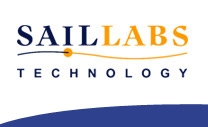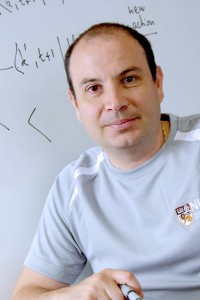Der Förderverein Technische Fakultät an der Alpen-Adria-Universität Klagenfurt wünscht allen Mitgliedern ein frohes Weihnachtsfest und einen guten Start in ein erfolgreiches Jahr 2014!
Sail Labs Technology AG: Junior Sales
13. Dezember 2013
 Sail Labs Technology AG is a leading global provider of speech recognition technology and was founded in 1999 in Vienna, Austria. We are one of the world’s leading innovators in the field of Open Source Intelligence (OSINT) and speech and language technology systems, creating cutting-edge software for speech and multimedia analysis solutions. SAIL Labs develops technologies to mine multi-media data and text including the indexing of audio, video and text, automatic speech recognition, transcriptions in multiple languages, named entity detection as well as topic detection. Our solutions allow content based search in multi-media files, automatic summarization and visualization. SAIL LABS Technology supports commercial applications (e.g., news monitoring, broadcast news transcription and indexing) as well as government applications (e.g., public opinion monitoring, surveillance and intelligence gathering).
Sail Labs Technology AG is a leading global provider of speech recognition technology and was founded in 1999 in Vienna, Austria. We are one of the world’s leading innovators in the field of Open Source Intelligence (OSINT) and speech and language technology systems, creating cutting-edge software for speech and multimedia analysis solutions. SAIL Labs develops technologies to mine multi-media data and text including the indexing of audio, video and text, automatic speech recognition, transcriptions in multiple languages, named entity detection as well as topic detection. Our solutions allow content based search in multi-media files, automatic summarization and visualization. SAIL LABS Technology supports commercial applications (e.g., news monitoring, broadcast news transcription and indexing) as well as government applications (e.g., public opinion monitoring, surveillance and intelligence gathering).
If you are a news junkie, digital native, easily excited by cool technology, love to travel and can sell products to various customers, then this job is for you!
We are looking for a
Junior Sales [PDF]
We offer a flexible, demanding, interesting and fun working environment. Our clients are located all across the globe (primarily Europe, Asia, Africa and Middle East) and are primarily large corporations, media outlets and government entities. The job is demanding, but at the same time offers a lot of variety and yields high tangible as well as non tangible rewards.
Requirements
- Self organized
- Preferred age between 22 and 30
- Some form of higher education (does not need to be completed yet)
- Experience in Sales, preferably in software or technology sales
- Technology savvy
- Fluency in English and at least one of the following: Spanish, Italian, French, Russian, Arabic or Portuguese
- Discretion and absolute integrity
- Willingness to travel up to 50% of the time
- EU citizenship
We offer
- Flexible working time, central working location (Vienna, 9th district)
- Application and customer oriented projects
- Young, ambitious team, humor and internationality
- Basic wage according to the Austrian collective bargaining agreement is at least a monthly salary of 2.173€ per month plus a very attractive commission system
We look forward to receiving your application via e-mail to recruitment@sail-labs.com
SAIL LABS Technology AG is an equal opportunity employer. Male and female applications are welcome.
SAIL LABS Technology AG Mariannengasse 14, 1090 Wien Tel +43 1 580 95-0 www.sail-labs.com
Posted in Stellenausschreibungen Kommentare deaktiviert für Sail Labs Technology AG: Junior Sales
Wie das intelligente Stromnetz unser Leben beeinflusst
6. Dezember 2013
Einladung zur Antrittsvorlesung:
Posted in TEWI-Kolloquium Kommentare deaktiviert für Wie das intelligente Stromnetz unser Leben beeinflusst
Emerging Communication
5. Dezember 2013
Kurzfassung
The presented work considers the relation of Shannon-type information to those semantic and hermeneutic aspects of communication, which are often referred to as meaning. It builds on considerations of Talcott Parsons, Niklas Luhmann and Robert K. Logan and relates them to an agent-based model that reproduces key aspects of the Talking Head experiment by Luc Steels. The resulting insights seem to give reason to regard information and meaning not as qualitatively different entities, but as interrelated forms of order that emerge in the interaction of autonomous (self-referentially closed) agents. Although on first sight, this way of putting information and meaning into a constructivist framework seems to open possibilities to conceive meaning in terms of Shannon-information, it also suggests a re-conceptualization of information in terms of what cybernetics calls Eigenform in order to do justice to its dynamic interrelation with meaning.
Vortragende(r)
Professor Füllsack holds a chair for Systems Science at the Institute of Systems Sciences, Innovation and Sustainability Research (ISIS) from the Karl-Franzens-University in Graz. The field of his studies is quite wide. It includes Informatics, Philosophy, Sociology, Mathematics and Music science at the University of Vienna. His research work is focused on Social Systems Theory, Network and Game theory, Modeling and Multi-agent simulation, Sociology, Economics and Philosophy of work. 1994 PhD in Philosophy at the University of Vienna 2003 Habilitation (Venia Docendi) for Social philosophy
Posted in TEWI-Kolloquium Kommentare deaktiviert für Emerging Communication
Search Based Techniques for Testing Software Product Lines – An Overview and Open Questions
28. November 2013
Software Product Lines (SPLs) are families of related software systems whose members offer different combinations of features. SPL practices have proven extensive economical and technological benefits and are becoming more pervasive in domains where systematic and disciplined software reuse is fundamental to keep up with customer demands. Consequently, SPL testing has received increasing attention both by researchers and practitioners whose main challenge is how to effectively and efficiently cope with the typically large number of feature combinations. In this talk, I will present an overview of how Search Based techniques have been deployed to tackle this problem, describe some of our ongoing work on combinatorial interaction testing and lay out some open questions that are venues for further research or collaboration.
Dr. Roberto Erick Lopez-Herrejon is currently a Lise Meitner Fellow (2012-2014) sponsored by the Austrian Science Fund (FWF) at the Johannes Kepler University in Linz Austria . Additionally, since 2008 he is an External Lecturer at the Software Engineering Masters Programme of the University of Oxford, England. From 2010-2012 he held an FP7 Intra-European Marie Curie Fellowship on a project for consistency and composition of variable systems with multi-view models. He obtained his PhD from the University of Texas at Austin in 2006, funded in part by a Fulbright Fellowship sponsored by the U.S. State Department. From 2005 to 2008, he was a Career Development Fellow at the Software Engineering Centre of the University of Oxford sponsored by Higher Education Founding Council of England (HEFCE). His expertise is software product lines, variability management, feature oriented software development, model driven software engineering, and consistency checking.
Posted in TEWI-Kolloquium Kommentare deaktiviert für Search Based Techniques for Testing Software Product Lines – An Overview and Open Questions
Optimal transmission policies for energy harvesting communication devices
27. November 2013
Energy Harvesting (EH) is a new paradigm in Wireless Sensor Networks (WSNs): sensor nodes are powered by energy harvested from the ambient, rather than by non-rechargeable batteries, thus enabling a potentially perpetual operation of the WSN. However, Energy Harvesting poses new challenges in the design of WSNs, in that energy availability is random and fluctuates over time, thus calling for radically different energy management solutions. In this talk we investigate the following fundamental question: how should the harvested energy be managed to ensure optimal performance? First, we consider a sensor powered by EH which senses data of varying importance and reports them judiciously to a Fusion Center. Assuming that data transmission incurs an energy cost, our objective is to identify low-complexity policies that achieve close-to-optimal performance, in terms of maximizing the average long-term importance of the reported data. We first consider schemes that rely on the assumption of perfect knowledge of the amount of energy available in the battery. Subsequently, we investigate the design of operation policies that maximize the long-term reward under imperfect knowledge of the State-Of-Charge (SOC). Moreover, for both scenarios, we explore the impact of time-correlation in the EH process, showing that simple adaptation to the state of the EH process yields close-to-optimal performance, without requiring full knowledge of the SOC of the battery.
Michele Zorzi is a Professor at the Department of Information Engineering of the University of Padova. Prior to his current appointment, he was employed at the Politecnico di Milano, the University of Ferrara and the University of California at San Diego, with which he still has an active collaboration. He is an IEEE Fellow. His main research interests are in the area of wireless communications and networking, sensor networks and IoT, underwater communications and networks, cognitive networking, and energy-efficient protocol design. His work is widely cited, with a total of more than 11000 citations and an h-index of 52.
Posted in TEWI-Kolloquium Kommentare deaktiviert für Optimal transmission policies for energy harvesting communication devices
Stellenausschreibungen: Salomon Automation GmbH
13. November 2013
 Wir leben Wertschätzung und Teamarbeit in unserem täglichen Tun und werden für unsere Handschlagqualität und Umsetzungsstärke am Markt geschätzt.
Wir leben Wertschätzung und Teamarbeit in unserem täglichen Tun und werden für unsere Handschlagqualität und Umsetzungsstärke am Markt geschätzt.
Wir wachsen weiter und suchen zur Verstärkung unserer erfolgreichen Teams engagierte:
- Emulations- & Anlagenvisualisierungstechniker (m/w) [PDF]
- Java Softwareentwickler – Produktentwicklung (m/w) [PDF]
- Java-Trainer (m/w) [PDF]
- Software Engineer (m/w) [PDF]
Teilen Sie mit uns die Leidenschaft und Begeisterung für Menschen, Software und Technik und übermitteln Sie uns Ihre vollständigen Bewerbungsunterlagen!
Salomon Automation GmbH, Friesachstraße 15, A-8114 Friesach bei Graz
Sabine Neumeister, MSc, HR Business Partner, Tel: +43 3127 200-464
Mag. Günther Proksch, HR Business Partner, Tel: +43 3127 200-261
job@salomon.at, www.salomon.at
Posted in Stellenausschreibungen Kommentare deaktiviert für Stellenausschreibungen: Salomon Automation GmbH
Humanistische Pädagogik begegnet Informatik und Internet – welcher Mehrwert kann aus dieser Begegnung für Lernende und Lehrende erwachsen?
4. November 2013
In diesem Vortrag wird das Wesen, die Entwicklung, Praxis und Erforschung von personzentriertem, technologie-erweitertem Lernen (PCeL) vorgestellt. PCeL integriert die zwischenmenschlichen Grundhaltungen des Personzentrierten Ansatzes nach Carl Rogers mit einem abgestimmten, förderlichen Einsatz web-basierter Technologien. PCeL wurde von der Vortragenden und ihrem Team an der Universität Wien entwickelt und erprobt. Während es auf der eigenen Praxis in Informatik- und Fachdidaktik- Lehrveranstaltungen basiert, wurde PCeL für den Unterricht in der Sekundarstufe II adaptiert und begleitend erforscht. Lehr-/Lernerfahrungen im Kontext der Informatik werden diskutiert.
Posted in TEWI-Kolloquium Kommentare deaktiviert für Humanistische Pädagogik begegnet Informatik und Internet – welcher Mehrwert kann aus dieser Begegnung für Lernende und Lehrende erwachsen?
Entwicklungsperspektiven der Informatikdidaktik
4. November 2013
Die zunehmende unreflektierte Nutzung digitaler Medien und Geräte bewirkt, dass gerade bei jungen Menschen Fehlvorstellungen darüber, was Informatik ist, zunehmen. Im ersten Teil des Vortrages wird eine Initiative zur Vermeidung solcher Fehlvorstellungen durch medienreduzierte Integration informatischer Kerninhalte in den Unterricht der Primarstufe vorgestellt. Kinder der Primarstufe lernen altersadäquat die Konzepte der Algorithmisierung und Automatisierung kennen, wobei an bestehende Lern- und Unterrichtsmuster der Primarstufe angeschlossen wird. Der zweite Teil des Vortrages geht auf Perspektiven für die Weiterentwicklung der Informatikdidaktik ein, die sich im Kontext der beginnenden Zusammenarbeit von Universitäten und Pädagogischen Hochschulen im Verbund Süd-Ost aus solchen Initiativen ergeben.
Posted in TEWI-Kolloquium Kommentare deaktiviert für Entwicklungsperspektiven der Informatikdidaktik
Visual Processing with Humans in the Loop
14. Oktober 2013
Abstract: It is now well known that many problems in image understanding and multimedia content analysis can benefit from human computations and crowdsourcing techniques. In this talk, we’ll first examine a few influential works from the literature where explicit tasks are performed by motivated workers (through altruistic incentives or personal enjoyment) and then combined with content analysis methods. In the second part of the presentation, our recent results on ‘zoomable video players’ will be briefly presented. These examples particularly highlight the use of implicit tasks to naturally infer knowledge about the visual or multimedia content.
Short-CV: Vincent CHARVILLAT received the Eng. degree in Computer Science and Applied Mathematics from ENSEEIHT, Toulouse France and the M.Sc. in Computer Science from the National Polytechnic Institute of Toulouse, both in 1994. He received the Ph.D. degree in Computer Science from the National Polytechnic Institute of Toulouse in 1997. He is currently a full professor at the University of Toulouse, IRIT research lab, ENSEEIHT Eng. School. Vincent CHARVILLAT is the head of VORTEX research team at ENSEEIHT. His main research interests are visual processing and multimedia applications. Current topics of research include visual object processing, visual compositing, visual interaction design and crowdsourcing in multimedia.

